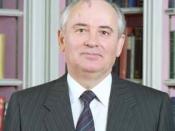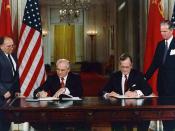The collapse of the Berlin Wall was the culminating point of the revolutionary changes sweeping East Central Europe in 1989. Throughout the Soviet bloc, reformers assumed power and ended over 40 years of dictatorial Communist rule. The reform movement that ended communism in East Central Europe began in Poland. Solidarity, an anti-Communist trade union and social movement, had forced Poland's Communist government to recognize it in 1980 through a wave of strikes that gained international attention. In 1981, Poland's Communist authorities, under pressure from Moscow, declared martial law, arrested Solidarity's leaders, and banned the democratic trade union. The ban did not bring an end to Solidarity. The movement simply went underground, and the rebellious Poles organized their own civil society, separate from the Communist government and its edicts.
In 1985, the assumption of power in the Soviet Union by a reformer, Mikhail Gorbachev, paved the way for political and economic reforms in East Central Europe. Gorbachev abandoned the "Brezhnev Doctrine"--the Soviet Union's policy of intervening with military force, if necessary, to preserve Communist rule in the region. Instead, he encouraged the local Communist leaders to seek new ways of gaining popular support for their rule. In Hungary, the Communist government initiated reforms in 1989 that led to the sanctioning of a multiparty system and competitive elections. In Poland, the Communists entered into round-table talks with a reinvigorated Solidarity. As a result, Poland held its first competitive elections since before World War II, and in 1989, Solidarity formed the first non-Communist government within the Soviet bloc since 1948. Inspired by their neighbors' reforms, East Germans took to the streets in the summer and fall of 1989 to call for reforms, including freedom to visit West Berlin and West Germany. Moscow's refusal to use military force to buoy the regime of...


